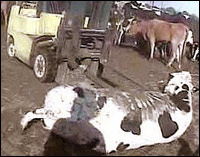At the end of December, hell came to the garden of eden.
Immediately following the Dec. 30 announcement that Kenya president Mwai Kibaki had been reelected in a vote widely believed rigged, blood began to flow in the great Rift Valley, often claimed as the inspiration for the biblical tale of the fabled garden. The first victims were mainly members of Kibaki's community, the Kikuyu. Then revenge attacks by Kikuyu youths against communities they perceive to be rivals began. And now, the killings have spread to Nairobi and areas not initially affected by the unrest. The violence has claimed over 1,000 lives and displaced over 250,000 people. U.S. envoy Jendayi Frazer, assistant secretary of state for African affairs, has called it "ethnic cleansing."
Contributing to the problem are arms sales, including ammunition made in Kenya by a European company. The plant has been blamed earlier for providing supplies to armed factions in the genocide that swept through Rwanda in 1994. Now Amnesty International has documented human rights violations by Kenyan forces using weapons manufactured at the same site. The EU has a decade-old code that stipulates that licences to export weapons cannot be issued if there is a threat they will be used for internal repression or in armed conflicts. But because these bullets are made outside the EU, they are not covered by the code.
Media bias also played a central role. A commissioner with the Media Council of Kenya said that long before the elections were held, local radio stations had ignited ethnic consciousness among the listeners "making them support leaders from their own tribe and harbor bad feelings about people from other communities." Media owners were likewise encouraging violence. "They had vested interests in either camp of the political divide," a reporter with Kenya Broadcasting Corporation (KBC) said, adding that he and his colleagues wanted to tell the real story but they couldn't because the stories could portray the government in a bad light. "We had beautiful clips and stories from the field, but we went back to the newsroom knowing that the story would never be used," he said.
|







